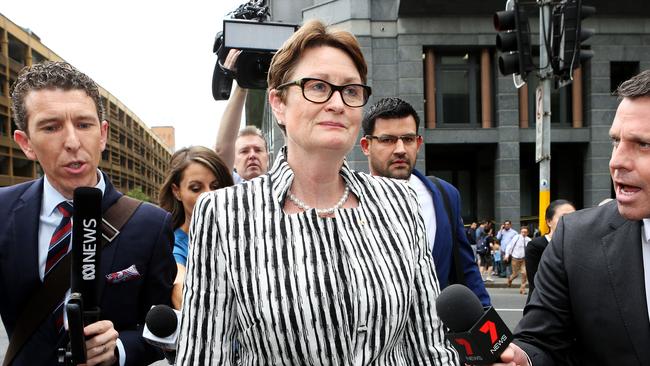Executive incentives absurd and pernicious
Rowena Orr’s questioning of CBA chair Catherine Livingstone elicited a picture of greedy, weak and incompetent directors.

The reason Commonwealth Bank has run into such trouble should now be obvious.
Its executives had short-term and long-term “incentives plans”, but not medium-term incentives, virtually guaranteeing problems in the next few years would be neglected.
The pernicious, rococo absurdity of executive remuneration at the Commonwealth Bank was on display yesterday as a senior lawyer — who manages to do a competent job without a byzantine bonus plan — revealed the shambolic state of governance at the country’s biggest company.
Rowena Orr’s questioning of CBA chair Catherine Livingstone elicited a picture of variously greedy, weak, and incompetent directors and executives.
Despite scandals since 2011 now too many to enumerate, it emerged the board, repeatedly, barely even trimmed executive bonuses, and were none too keen to part with any of their own lavish fees either. At least they can’t be accused of hypocrisy!
Changes, however glacial, only started once the media — that is, workers earning a small fraction of the sums paid to the so-called professional directors — began to provide scrutiny. As the royal commission reaches its crescendo, it’s worth asking what the boards of directors of these banks have been doing. Directors are paid to look out for the shareholders’ long-term interests.
Last year, Ms Livingstone was paid $752,339, and $571,714 the year before. The other CBA board members, about eight of them, earned roughly $300,000 to attend the same or slightly fewer meetings. And that wouldn’t include lunch.
Shareholders have received shocking value for money, except perhaps for corporate social responsibility: former CEO Ian Narev scored 100 per cent on “culture, talent, diversity, safety and wellbeing” (whatever that means), the annual report said.
Peter Swan, a professor of finance at UNSW who has studied director incentives for years, wasn’t surprised, arguing yesterday the army of “so-called ‘independent’ directors” who populate boards don’t have strong incentives to monitor their companies or discipline executives.
“CEOs and board chairs can blame each other endlessly but such blame-passing is not only irrelevant, it does nothing to fix the malaise,” he told The Australian.
“It looks as though board members of major banks see their role as one of protecting the short-term bonuses of CEOs and other senior executives, which have been founded on mistreating their own customers, to the maximum possible extent,” he added.
Board directors are undoubtedly fine and distinguished people in general, but to qualify as “independent” the rules prevent them from having significant shareholdings in the companies on whose boards they sit. It means they don’t feel the same pain as shareholders. Is it wise to mandate directors with little skin in the game?
Moreover, directors often have other board positions, which could make it hard to focus. Ms Livingstone is also Chancellor of University of Technology, Sydney, and on three other boards.
There are no perfect solutions but maybe directors should have shareholdings in the companies they oversee, and be restricted to being a director of just one major company.




To join the conversation, please log in. Don't have an account? Register
Join the conversation, you are commenting as Logout